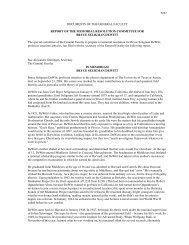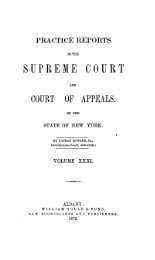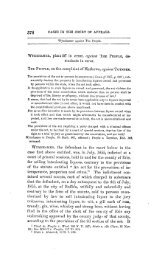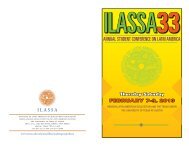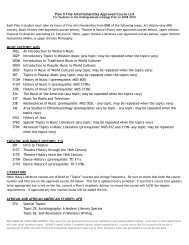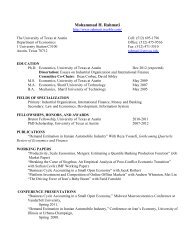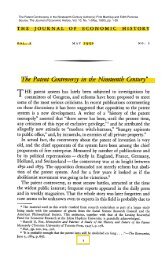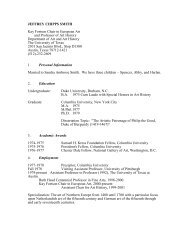The Educational Boundary. - The University of Texas at Austin
The Educational Boundary. - The University of Texas at Austin
The Educational Boundary. - The University of Texas at Austin
You also want an ePaper? Increase the reach of your titles
YUMPU automatically turns print PDFs into web optimized ePapers that Google loves.
She began to fall behind in her reading for classes, and delayed taking a first analytic case because <strong>of</strong> thetime she was devoting to helping the institute administr<strong>at</strong>ion. When her advisor, a junior faculty member,suggested to the president <strong>of</strong> the institute th<strong>at</strong> the lack <strong>of</strong> a first case was having a neg<strong>at</strong>ive effect on thecandid<strong>at</strong>e's educ<strong>at</strong>ional experience, the president accused the junior faculty member <strong>of</strong> envy <strong>of</strong> thecandid<strong>at</strong>e for her prized position. <strong>The</strong> junior faculty member st<strong>at</strong>ed th<strong>at</strong> the candid<strong>at</strong>e lacked clinicalexperience, and th<strong>at</strong> it was very important th<strong>at</strong> she start a case, were her classes to be experienced asclinically relevant. <strong>The</strong> president <strong>of</strong> the institute again accused the advisor <strong>of</strong> envy. It was not until wellinto her second year <strong>at</strong> the institute th<strong>at</strong> the candid<strong>at</strong>e recognized th<strong>at</strong> she was not gaining the insight intoindividual psychology which had led her into training in the first place. At th<strong>at</strong> point she was able to cutback on her consulting work with the administr<strong>at</strong>ion. <strong>The</strong> loss to the candid<strong>at</strong>e was not irreparable,although she did feel th<strong>at</strong> she had lost much from her training experience up to the point <strong>at</strong> which sheremembered why she had sought it to begin with. She also learned in her personal analysis th<strong>at</strong> she hadunconsciously used the lure <strong>of</strong> a special place within the institute as a resistance to her own deepeningunderstanding <strong>of</strong> her unconscious processes. It was never known if the president <strong>of</strong> the institute conductedsome sort <strong>of</strong>- 208 -parallel self-inquiry into why he had been insensitive to the candid<strong>at</strong>e's situ<strong>at</strong>ion as a non-clinician <strong>at</strong> thestart <strong>of</strong> an analytic career. Some observers within the institute believed th<strong>at</strong> the president wasp<strong>at</strong>hologically narcissistic, arrogant, and competitive, but the president's refusal to look inward and sharehis conclusions with colleagues meant th<strong>at</strong> some <strong>of</strong> these beliefs could never be more than specul<strong>at</strong>ions.An <strong>at</strong>tack against a supervisorA candid<strong>at</strong>e was in supervision with an individual who was a leader in his institute. <strong>The</strong> supervisorwas an older man, with a n<strong>at</strong>ional reput<strong>at</strong>ion and a charism<strong>at</strong>ic personality. He was also old-fashioned,somewh<strong>at</strong> authoritarian, popular with candid<strong>at</strong>es, and an object <strong>of</strong> envy and competition among hiscolleagues.In th<strong>at</strong> institute, candid<strong>at</strong>es were assigned their supervisors, and were required to request permissionfor a desired change from the educ<strong>at</strong>ion committee. <strong>The</strong> educ<strong>at</strong>ion committee wanted to scrutinize thereasons for the change, in the belief th<strong>at</strong> would give a better picture <strong>of</strong> the candid<strong>at</strong>e's progress.It happened th<strong>at</strong> the candid<strong>at</strong>e's analyst did not like the supervisor because <strong>of</strong> a bitter rivalry with him.While he had been restrained when the candid<strong>at</strong>e accepted the assigned supervisor, he had taken adifferent approach whenever the candid<strong>at</strong>e associ<strong>at</strong>ed to him or the case under his supervision. <strong>The</strong>n, theanalyst was harshly critical <strong>of</strong> his colleague. Eventually, in response to this, the candid<strong>at</strong>e asked theeduc<strong>at</strong>ion committee for a change in supervisor, though previously he had been quite s<strong>at</strong>isfied by hislearning experience.<strong>The</strong> educ<strong>at</strong>ion committee became involved. A member <strong>of</strong> th<strong>at</strong> committee spoke with the candid<strong>at</strong>e,and then the supervisor, who s<strong>at</strong> on the educ<strong>at</strong>ion committee, spoke about his experience with thecandid<strong>at</strong>e. He talked about how well he had thought the supervision had been going. Curiously, thecandid<strong>at</strong>e reported th<strong>at</strong> his analyst had encouraged him to switch supervisors, and the entire educ<strong>at</strong>ioncommittee was aware <strong>of</strong> the bitter rivalry which existed between the training analyst and the supervisor. Inthe end, the educ<strong>at</strong>ion committee was critical <strong>of</strong> the supervisor, suggesting he had been authoritarian andinsensitive to the candid<strong>at</strong>e, and had missed the bo<strong>at</strong> about how the candid<strong>at</strong>e had felt overly controlled byhim in the conduct <strong>of</strong> the case. <strong>The</strong> supervisor concluded in his own mind th<strong>at</strong> envious colleagues wereusing this situ<strong>at</strong>ion to <strong>at</strong>tack him. <strong>The</strong>re was never any discussion among the relevant faculty members <strong>of</strong>the many interpersonal issues which ‘might’ have been involved.From the perspective <strong>of</strong> the candid<strong>at</strong>e's educ<strong>at</strong>ion there was a significant loss. <strong>The</strong> candid<strong>at</strong>e had beenmisused by his analyst in a personal struggle, and as time passed he came to know it. He then began tohold back in using his analysis to discuss countertransference issues experienced with his control cases,for fear <strong>of</strong> how his analyst might misuse such associ<strong>at</strong>ions in ways which reflected his personal feelingsabout other supervisor colleagues. When, <strong>at</strong> the time <strong>of</strong> his gradu<strong>at</strong>ion, he looked back on his analyticeduc<strong>at</strong>ion he was regretful <strong>at</strong> this loss <strong>of</strong> the opportunity to have an analytic experience in which he couldlearn more about hiscountertransference tendencies and responses. Two years l<strong>at</strong>er he went backinto analysis with a different senior analyst, and obtained supervision from two senior supervisors fromanother institute.- 209 -This example is particularly interesting because many years l<strong>at</strong>er both the former training analyst and




